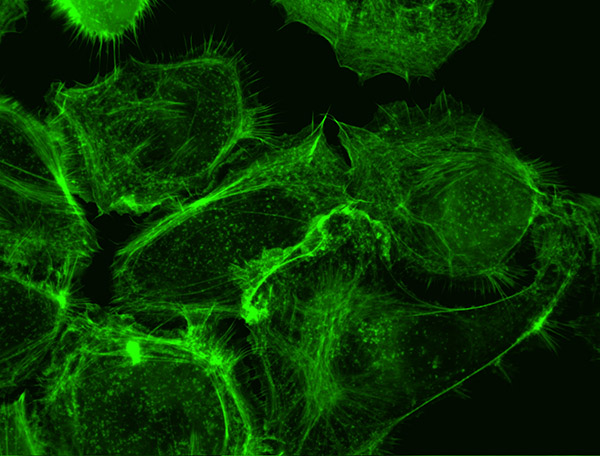Latest News
Research
Study of head and neck cancer data from The Cancer Genome Atlas redefines HPV-related cancers
Apr 27, 2017

Much of what we thought we knew about the human papillomavirus (HPV) in HPV-related head and neck cancers may be wrong, according to a newly published study by Virginia Commonwealth University (VCU) researchers that analyzed data from The Human Cancer Genome Atlas. Head and neck cancers involving HPV are on the rise, and many experts believe we are seeing the start of an epidemic that will only get worse in the coming years.
The Cancer Genome Atlas is the result of collaboration between the National Cancer Institute (NCI) and the National Human Genome Research (NHGR) Institute that makes publicly available genomic information on tumor samples from 33 different types of cancer. Its aim is to help the cancer research community improve the prevention, diagnosis and treatment of cancer.
The commonly held belief is that there are two main forms of HPV-related cancers: episomal and integrated. In episomal variants, the HPV genome replicates independently. Integrated HPV has become part of the DNA of the host cell and relies on it for replication. Previously, it was believed that most HPV-related head and neck cancers, as well as cervical cancers, had integrated HPV. However, Windle’s study, recently published in the journal Oncotarget, found that HPV DNA is maintained separate from the human genome in the majority of HPV-related head and neck cancers, but, in many cases, the HPV genome can acquire a small piece of human DNA, thereby making it look like integrated HPV. This viral-human hybrid represents a new category of episomal HPV in HPV-related cancers.
“Our work challenges the idea that finding HPV DNA joined to human DNA means that HPV is integrated. With this new view of the state of HPV, we conclude that episomal HPV is the predominant state in HPV-related head and neck cancers,” says Brad Windle, member of the Cancer Molecular Genetics research program at VCU Massey Cancer Center, professor at the Philips Institute for Oral Health Research at the VCU School of Dentistry and co-principal investigator on the study. “This is an important distinction, because patients with episomal HPV cancer respond better to therapy than patients with integrated HPV cancer.”
Windle’s team analyzed the genomes of all 520 head and neck cancer samples in The Cancer Genome Atlas and found that 72 were HPV positive. The large majority of these cancers had present a common type of the virus known as HPV16, so they focused on that virus type. The data showed that 75 percent of the HPV16 samples had the HPV genome in the episomal state, and about half of the genomes contained a piece of human DNA within their circular structure.
The researchers also found that 73 percent of the tumor samples were still dependent on proteins known as E1 and E2 for replication. This finding is important, because when the HPV genome integrates with human DNA, expression of the HPV E2 protein—essential for independent replication—is lost. The presence of E2, or lack thereof, in tumor biopsies may be a reliable way for physicians to determine the cancer type and provide a more accurate prognosis.
“Perhaps our most striking outcome is the potential to target the E1 and E2 proteins for diagnosis and treatment,” says Windle. “With nearly three-quarters of these cancers dependent on E1 and E2 for replication, we may be able to develop drugs that target these proteins and promote cell death.”
Windle’s team plans to continue studying the integration of HPV in HPV-related head and neck cancers and suggests that viral-human DNA hybrid HPV should be further explored in HPV-related cervical cancers. His team is currently working with Massey clinicians in order to use this information to assess patients’ prognosis in the clinic.
Windle collaborated on this research with co-principal investigator Iain M. Morgan, member of the Cancer Molecular Genetics research program at Massey and director and professor at the Philips Institute for Oral Health Research at the VCU School of Dentistry; as well as and Tara J. Nulton, from the VCU Philips Institute for Oral Health Research; Amy L. Olex, from the C. Kenneth and Dianne Wright Center for Clinical and Translational Research at VCU; and Mikhail Dozmorov, Ph.D., member of Massey’s Cancer Molecular Genetics program and C. Kenneth and Dianne Wright Center for Clinical and Translational Research and assistant professor in the Department of Biostatistics at VCU.
This study was supported by a grant from the National Institute of Dental and Craniofacial Research, VCU’s National Institutes of Health Clinical and Translational Science Awards (CTSA) grant UL1TR000058, and, in part, by VCU Massey Cancer Center’s NCI Cancer Center Support Grant P30CA016059.
Written by: John Wallace
Related News
Research
Massey welcomes Venkata Battula, Ph.D., as assistant director of Cancer Research Training and Education Program (CRTEC)Jul 21, 2025
Research
Robert A. Winn Clinical Investigator Pathway Program welcomes fourth cohort of medical student awardeesJul 8, 2025
Research
“We’re aiming for a cure.” Massey and VIMM researchers achieve potential breakthrough in brain cancer treatmentJun 24, 2025

Get access to new, innovative care
Treatments in clinical trials may be more effective or have fewer side effects than the treatments that are currently available. With more than 200 studies for multiple types of cancers and cancer prevention, Massey supports a wide array of clinical trials.

Find a provider
Massey supports hundreds of top cancer specialists serving the needs of our patients. Massey’s medical team provides a wealth of expertise in cancer diagnosis, treatment, prevention and symptom management.
